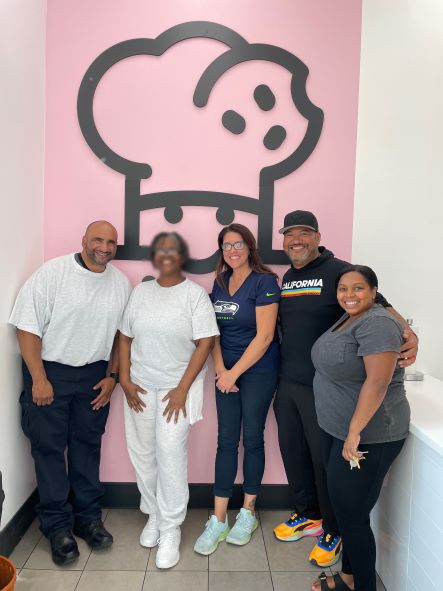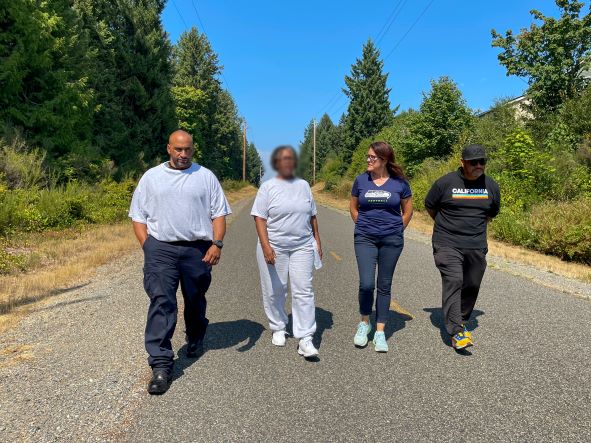The Department of Change: Amending Reentry for All
November 1, 2023
By Lukas D'Ambrosio (email) Communications Office
(Left to Right) Lieutenant Simons, Leslie, Superintendent Headley, Correctional Unit Supervisor Afalava, Administrative Assistant Jones pose for a picture at Crumbl Cookie in Gig Harbor. (Photo courtesy of Lukas D'Ambrosio Communications Office)
The reentry process is a crucial aspect of every incarcerated individuals’ success in effectively reintegrating with society after incarceration. Studies have shown a significant drop in recidivism rates when individuals have access to programming that aids in this process of normalization. The Washington State Department of Corrections (DOC) knows this and prioritizes individuals access to this programming. Reentry can look different for each individual. Some individuals are able to serve the last months of their sentence at Reentry Centers or with electric home monitoring thanks to the Graduated Reentry Program (GRE). GRE was a legislative bill that was passed in 2018, expanded on in 2021 and implemented by the department. Graduated Reentry provides opportunities for incarcerated individuals to develop the skills they need for reintegration. They are provided with opportunities for employment, education and have access to treatment like cognitive behavioral therapy. Unfortunately for some individuals, they do not qualify for Graduated Reentry. Sentencing guidelines from yesteryear or simply the nature of an individuals’ sentence are among the qualities that can disqualify them for eligibility. This leaves some individuals at a significant disadvantage to their reentry process. Without the normalization and resources provided by GRE, reintegration to society can be stressful and difficult to navigate. Every facility has cases like this, but Washington Corrections Center for Women (WCCW) is using the Washington Way principles, from the department’s partnership with Amend, to try to change the outcomes for these individuals.
“If you have individuals that do not know how to successfully navigate their daily life, they're naturally going to come back into the system and do the same thing,” said Dennis Simons, a Lieutenant at WCCW. “This is what they know, but if we can change their mindset and change the way they look at things and be able to show them that they can change, that they can be successful role models, inside and outside the facility, it'll give them a new perspective on how they handle their daily life and hopefully help them not return to this environment.”
Leslie, an incarcerated individual at WCCW, is someone who does not qualify for GRE. That has not stopped her from doing everything in her power to better herself with the opportunities provided to her while in prison.
“Leslie is a model incarcerated individual who has been in the system for a long time and has always shown exemplary behavior,” said Lieutenant Simons.
Leslie has always been aware of the fact that she is not eligible for GRE and has spent years connecting and working with DOC staff and leadership in an effort to create something to aide in her reentry.
“This is something that I have been fighting for, for as long as I’ve been in prison,” said Leslie. “I would leave it alone and then I’d come back to it.”
Staff at WCCW took note of Leslie’s ideas and worked with her where possible. Sergeant Kabrina Riley wrote a full proposal with Leslie’s ideas that would allow for supervised outings into the community according to DOC 420.110 Escorted Leaves and Furloughs(pdf). Leslie was also screened and approved for a gate card. A gate card allows for individuals to go outside the prison fence line, unrestrained, with a staff member. A gate card can only be obtained by an individual if they are the correct classification level and have been reviewed and deemed eligible by policy and security standpoint. Gate cards are standard practice for prisons and granted to individuals who are behavior appropriate and have earned progression to the Minimum Custody level. They are obtained and used by incarcerated individuals every day to work outside the fence line for jobs such as Department of Natural Resources (DNR) and Community Service crews.
This summer, Leslie was able to go into the community for the first time in years thanks to this program. Accompanied by Superintendent Headley, Lieutenant Simons, CUS Afalava, and Administrative Assistant Jones, Leslie took her first unrestrained steps, outside of the facility at Cushman Trail in Gig Harbor.
“Even with this being a new program, safety was the priority, said WCCW CUS Roger Afalava. “Not just for the community but for Leslie as well. That’s why you have the specific staff you have in these outings to listen to her input and make sure she feels comfortable.”
The group walked the trail for two miles, interacting with those on the trail, petting patrons’ dogs and even stopping to pick a few blackberries from a bush along the trail.
“When I stepped out of the car at the trail, I didn’t have on handcuffs, I didn’t have shackles around my ankles, I wasn’t wearing my ID, no one around me knew that I was an incarcerated individual,” said Leslie about the experience. “I thought how unbelievable this is and yet I’m here. I feel so grateful to have gotten this opportunity.”
After the group finished on the trail, they made stops at McDonalds and Crumbl Cookie. Leslie was able to interact with workers like cashiers, as well as experience new additions to society that she had only ever heard about, like the digital menu kiosks at McDonalds.
“Seeing someone experience something for the first time always brings out a sense of fulfillment, said Lieutenant Simons. “Knowing that you helped this person throughout their process and to see her not take that for granted is so gratifying.”
This outing is the first of its kind in Washington State and stands to benefit many incarcerated individuals in the future.
“She has the opportunity to blaze a new trail with these types of experiences for individuals, not only in the Women's division, but also with incarcerated individuals in general that have similar cases or scenarios,” said CUS Afalava. “There can be some pushback to new ideas like this but, to quote another staff member, why would you not want to effect change? Programs like this are where the department is headed but more than that it’s a humanistic approach. I want to be a part of that because when they say the Department of Change, it’s not just for the incarcerated, it’s for the staff and the approach as well.”
Each staff member that attended the outing is in full support of programs like this that benefit individuals in similar situations to Leslie’s.
“Being an active part of Leslie’s progression and reentry plan is a meaningful way for me to support Leslie and the WCCW Washington Way team’s dedication to Leslie’s success in the community” said Superintendent Charlotte Headley. “We are in the business of building better neighbors, and I am proud of the team for their commitment to supporting Leslie during this time of transition.”
“Allowing for individuals like Leslie, who don’t qualify for reentry, to have these types of outings will remove obstacles in their journey,” said Lieutenant Simons. “This may hinder their process from transitioning successfully and that's not what we want. We want to help transition them from prison to life outside, decrease recidivism and increase the positive emotional state of individuals and staff in this environment.”
Leslie fully understands how special the opportunity that she has been given is. She hopes to continue to work with WCCW and DOC staff to help expand this program to other individuals in similar situations. She is hoping for her next outing to be at a grocery store.

